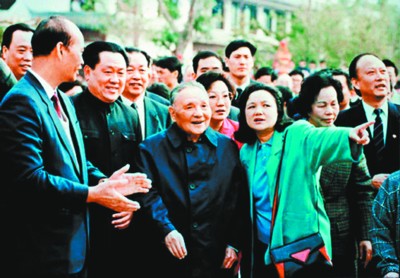After 'Black Monday' - Time to take stock
- By Heiko Khoo
 0 Comment(s)
0 Comment(s) Print
Print E-mail China.org.cn, August 26, 2015
E-mail China.org.cn, August 26, 2015
|
|
|
During Deng Xiaoping's Southern Tour in 1992 he summarized his attitude towards the use of stock market experiments. |
During Deng Xiaoping's Southern Tour in 1992 he summarized his attitude towards the use of stock market experiments. He believed it was necessary to exploit them effectively, but also, when necessary, to control any negative impact they might have. Deng said:
"Are securities and the stock market good or bad? Do they entail any dangers? Are they peculiar to capitalism? Can socialism make use of them? We allow people to reserve their judgement, but we must try these things out. If, after one or two years of experimentation, they prove feasible, we can expand them. Otherwise, we can put a stop to them and be done with it. We can stop them all at once or gradually, totally or partially. What is there to be afraid of? So long as we keep this attitude, everything will be all right, and we shall not make any major mistakes."
The recent turbulence in China's stock markets is being discussed in Western media outlets as if it signals the end of China's economic growth and a new era of booms and slumps - just like any capitalist economy. Some argue that although China avoided the economic crisis after 2008, now, a hard landing, or economic contraction is the order of the day. Western stock markets are said to be jittery because a sharp slowdown in China's growth could spill over into a global economic crisis. It is true that China's government has struggled to keep shares stable or rising and this has consumed more resources than desirable. Indeed, as Deng said, there may be a point at which markets can and should be closed; if they cause more harm than benefit to society.
However, it is important to understand the character of China's stock markets to grasp the limits of their capacity to negatively impact on the wider Chinese economy. Stock markets value enterprises through share ownership. In the 1970s, the assets that belonged to state entities in China were undefined. Consequently it was impossible to put a value on enterprises and institutions.
In the early 1990s, the transformation of China's enterprises into corporate share-based structures opened the possibility to trade shares and raise capital. A general audit of state enterprises was conducted, which identified their assets and subtracted their liabilities. This determined the net-asset-value of these enterprises, which could then be denominated in shares. Control over state owned enterprise assets fell to parent companies and to the heads of supervisory agencies. These shares were divided between tradable A-shares and non-tradable state shares. Non-tradable shares were designed to stop wholesale privatization, whereas A-shares would be floated. At that time the main objective was to use A-shares to raise money and to contain any danger that speculative fluctuations might undermine stability.







Go to Forum >>0 Comment(s)